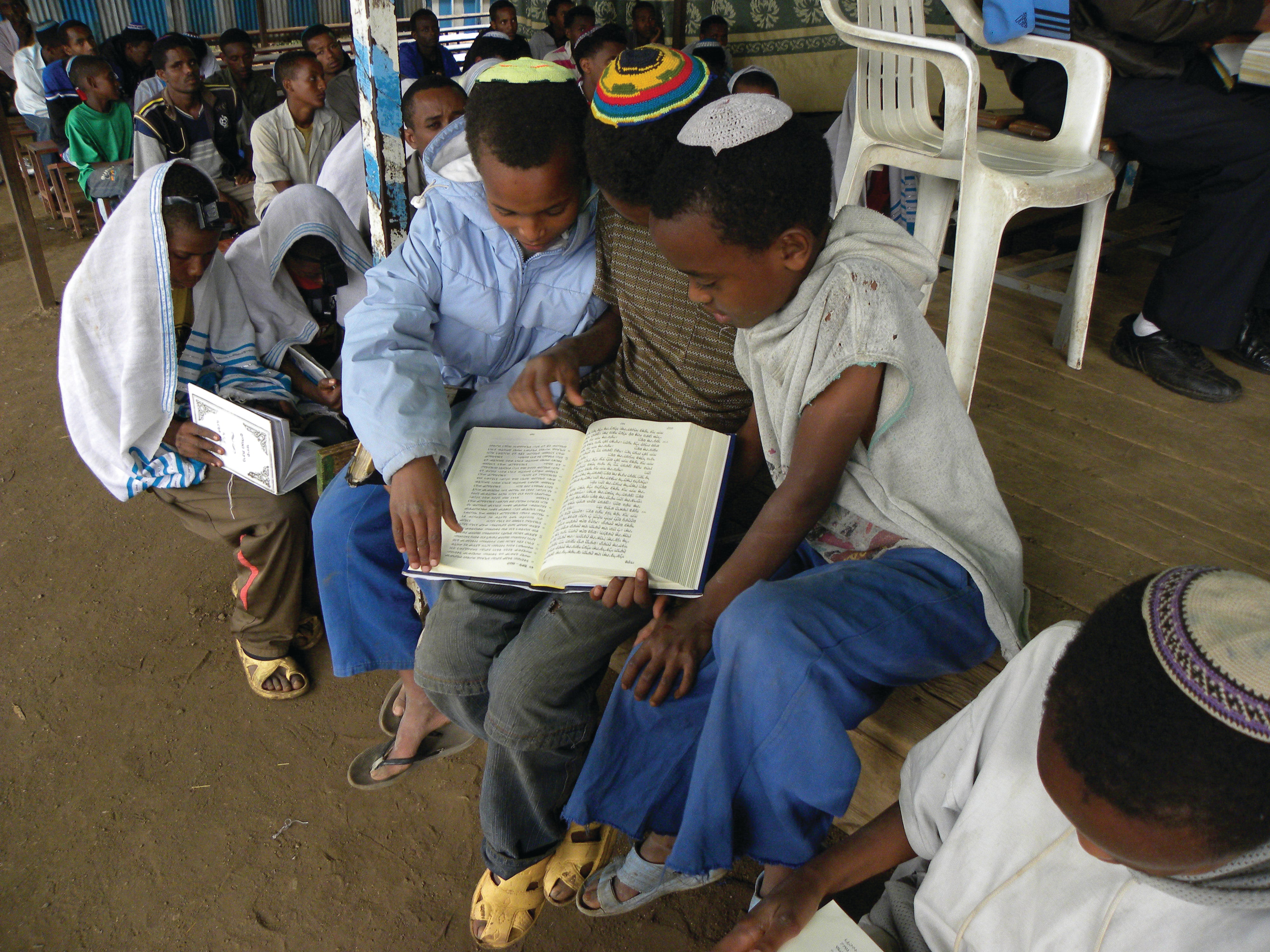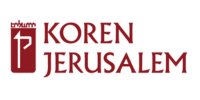For Sigd, the world's first Amharic Siddur & Humash
This week, the 29th of Heshvan, the Ethiopian Jewish community (called
Beta Israel) will celebrate a holiday called Sigd. The holiday, meaning "prostration", has been celebrated for generations. On this day, the community ascends a high mountain (a symbol of Mt. Sinai) and gathers as the priest (the
kes) reads from the Urit, a Torah scroll written in the Gez language. He reads the portions that recount the revelation at Mt. Sinai, followed by sections from the book of Nehemiah that address the renewal of the covenant between the nation and Hashem. He then chants the blessings and curses in the book of Devarim. The ceremony concludes with a prayer for forgiveness for their sins (similar to Yom Kippur) and a prayer that they will celebrate the holiday in Jerusalem.
The ceremony centers on the
kes reciting the tefillot on behalf of the community mainly because the Beta Israel never had published prayer books of their own. The
kessim passed down the Urit from generation to generation and composed a number of personal and public tefillot which were recited in Gez and in Agaou, a language that is not spoken today and understood by very few. Most of these prayers were passed down orally or were handwritten, at best.
It is therefore a landmark in Jewish history that Beta Israel finally have prayer books of their own. Under the guidance ofRabbi Menachem Waldman, an expert on Ethiopian Jewry, Koren Publishers producedthe
Koren Amharic Siddur and
Koren Amharic Humash, the first-ever printed prayer book and Humash for the Ethiopian Jewish community. Both publicationsfeature Hebrew and Amharic in parallel translations to help members of Beta Israel of all ages integrate into the religious and spiritual fabric of Israel.

The Koren Amharic Siddur features parallel translations in Hebrew & Amharic.

Since the 1990s, more than 50,000 Jews from Ethiopia have emigrated to Israel. Groups settled throughout Israel and are integrating into Israeli society. However, since Beta Israel were disconnected from all other Jewish communities for so many generations, the tefillot and customs as they are practiced in synagogues, were foreign to them. Many had learned about Jewish customs and had studied Hebrew while living in transit camps as they awaited approval for aliyah. They were given siddurim in Hebrew or Hebrew with English translations, but many found it extremely difficult to read the texts or follow along.
Koren Publishers realized the dire need to provide these basic Jewish texts, books that that would help the Beta Israel become more comfortable with spiritual life in their new homes in Israel. It is the first time they have had prayer books and a Humash in Amharic, the language currently spoken by the Jews of Ethiopia.
The Koren Amharic Siddur includes tefillot for weekday, Shabbat, holidays, and special life events, along with a special memorial prayer for those who perished during their arduous desert journey through the Sudan as they made their way to Israel. The Siddur follows the Koren Siddur Sepharadim, which explains the customs and prayer variations of every Sepharadic community from the Middle East and North Africa. (Since most synagogues in Israel are a variation of Nusah Sepharadim,this was the most natural foundation for the Amharic Siddur.) The
Koren Amharic Humash contains Torah and Haftarah readings for Shabbat and special Shabbatot, five Megillot, the entire Book of Tehillim and appendices.
The Jews of Ethiopia were discovered by Dr. Jacob Feitlowitz, a Jew from Poland, in the early 20th century. Until that time, they were completely disconnected from other Jewish communities around the world. Therefore, they had no awareness about halakha (Jewish law) as it developed in the Diaspora, the writings of
Hazal or set prayers as we see in the Siddur (all Siddurim, regardless of Nusah follow the same structure:
Birkot HaShahar, Pesukei DeZimrah, Kriyat Shema and its blessings, Amidah, etc).

Children using the Koren Amharic Humash in Addis Ababa, Ethiopia, as they await approval for aliyah.
Dr. Feitlowitz became fascinated with the community and took steps to teach
Beta Israel about Jewish law and traditions. He taught Hebrew and even opened a Hebrew school in Addis Ababa. Little by little, the community started to learn more about mainstream Jewish life, but had to rely on Hebrew siddurim, Hebrew humashim, and eventually English-Hebrew siddurim provided by the
NCOEJ . Over the past thirty years, Rabbi Waldman has taken on the mantle of assisting tens of thousands of members from
Beta Israel to make aliyah, with help from The Jewish Agency. He has traveled to Ethiopia dozens of times and documented their story for the
Koren Ethiopian Haggada: Journey to Freedomand
Longing for Zion: Awaiting Aliyah.
Rabbi Waldman recruited Zahdu Barhan a seasoned Ethiopian Jewish educator, to translate the beautiful prose of the tefillot into Amharic. Such a feat is not simple; one needs a deep knowledge of Hebrew
, an intimate understanding of Jewish prayer and its nuances, knowledge of Tanakh which is quoted through the tefillot, and be able to make the text meaningful for the end-users: Ethiopian Jews young and old. Fortunately Zahdu also completed the translation of the Hebrew-Amharic Humash.
Both of these publications mark a special time in Jewish history - the ingathering of the exiles and actualizing the dream ofSigdto celebrate together in Zion.It is our hope that both of these historic publications help the
Beta Israel feel comfortable in every synagogue and allow the young generations of Sabras of Ethiopian heritage to pray alongside their elders.
We at Koren are proud and honored to publish such beautiful, special books that embrace the unique Jewish heritage of Beta Israel.
Wishing all a very joyous Sigd!

 The Koren Amharic Siddur features parallel translations in Hebrew & Amharic.
The Koren Amharic Siddur features parallel translations in Hebrew & Amharic. Since the 1990s, more than 50,000 Jews from Ethiopia have emigrated to Israel. Groups settled throughout Israel and are integrating into Israeli society. However, since Beta Israel were disconnected from all other Jewish communities for so many generations, the tefillot and customs as they are practiced in synagogues, were foreign to them. Many had learned about Jewish customs and had studied Hebrew while living in transit camps as they awaited approval for aliyah. They were given siddurim in Hebrew or Hebrew with English translations, but many found it extremely difficult to read the texts or follow along.
Koren Publishers realized the dire need to provide these basic Jewish texts, books that that would help the Beta Israel become more comfortable with spiritual life in their new homes in Israel. It is the first time they have had prayer books and a Humash in Amharic, the language currently spoken by the Jews of Ethiopia.
The Koren Amharic Siddur includes tefillot for weekday, Shabbat, holidays, and special life events, along with a special memorial prayer for those who perished during their arduous desert journey through the Sudan as they made their way to Israel. The Siddur follows the Koren Siddur Sepharadim, which explains the customs and prayer variations of every Sepharadic community from the Middle East and North Africa. (Since most synagogues in Israel are a variation of Nusah Sepharadim,this was the most natural foundation for the Amharic Siddur.) The Koren Amharic Humash contains Torah and Haftarah readings for Shabbat and special Shabbatot, five Megillot, the entire Book of Tehillim and appendices.
The Jews of Ethiopia were discovered by Dr. Jacob Feitlowitz, a Jew from Poland, in the early 20th century. Until that time, they were completely disconnected from other Jewish communities around the world. Therefore, they had no awareness about halakha (Jewish law) as it developed in the Diaspora, the writings of Hazal or set prayers as we see in the Siddur (all Siddurim, regardless of Nusah follow the same structure:Birkot HaShahar, Pesukei DeZimrah, Kriyat Shema and its blessings, Amidah, etc).
Since the 1990s, more than 50,000 Jews from Ethiopia have emigrated to Israel. Groups settled throughout Israel and are integrating into Israeli society. However, since Beta Israel were disconnected from all other Jewish communities for so many generations, the tefillot and customs as they are practiced in synagogues, were foreign to them. Many had learned about Jewish customs and had studied Hebrew while living in transit camps as they awaited approval for aliyah. They were given siddurim in Hebrew or Hebrew with English translations, but many found it extremely difficult to read the texts or follow along.
Koren Publishers realized the dire need to provide these basic Jewish texts, books that that would help the Beta Israel become more comfortable with spiritual life in their new homes in Israel. It is the first time they have had prayer books and a Humash in Amharic, the language currently spoken by the Jews of Ethiopia.
The Koren Amharic Siddur includes tefillot for weekday, Shabbat, holidays, and special life events, along with a special memorial prayer for those who perished during their arduous desert journey through the Sudan as they made their way to Israel. The Siddur follows the Koren Siddur Sepharadim, which explains the customs and prayer variations of every Sepharadic community from the Middle East and North Africa. (Since most synagogues in Israel are a variation of Nusah Sepharadim,this was the most natural foundation for the Amharic Siddur.) The Koren Amharic Humash contains Torah and Haftarah readings for Shabbat and special Shabbatot, five Megillot, the entire Book of Tehillim and appendices.
The Jews of Ethiopia were discovered by Dr. Jacob Feitlowitz, a Jew from Poland, in the early 20th century. Until that time, they were completely disconnected from other Jewish communities around the world. Therefore, they had no awareness about halakha (Jewish law) as it developed in the Diaspora, the writings of Hazal or set prayers as we see in the Siddur (all Siddurim, regardless of Nusah follow the same structure:Birkot HaShahar, Pesukei DeZimrah, Kriyat Shema and its blessings, Amidah, etc).
 Children using the Koren Amharic Humash in Addis Ababa, Ethiopia, as they await approval for aliyah.
Children using the Koren Amharic Humash in Addis Ababa, Ethiopia, as they await approval for aliyah.
